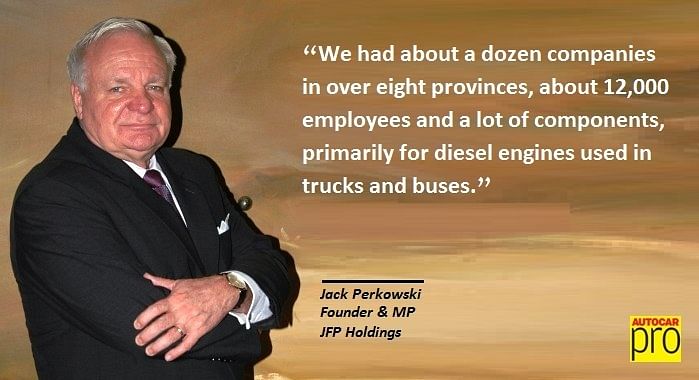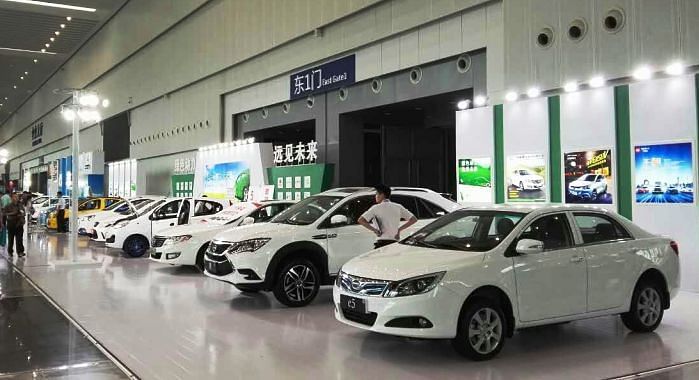The American who made it big in China
Many move to the USA to live the American dream. But here’s the story of an American who has made it big in China. Jack Perkowski, founder & managing partner of JFP Holdings reveals how he made it.
There’s a Chinese film titled ‘American Dreams in China’ which revolves around three friends who set up an English language school with a plan to list it in the US stock market. The title could well fit the story of Jack Perkowski, a Wall Street veteran who came to China in the early 1990s and went on to build a $600 million enterprise.
“I decided that I wanted to do something completely different for my second career, and I got interested in Asia. I came to Hong Kong, and quickly figured out that China was the real driver,” says Perkowski. That’s almost like picking a stock much before it becomes blue-chip equity. Perkowski came to China first in August 1992, when the country’s automobile industry size stood at 500,000 units. In other words, it was 1/50th the size of the industry volume of 2015! As an investment banker, he may have helped many clients take major investment decisions based on long-term prospects but Perkowski admits he couldn’t have predicted that the Chinese automobile industry would grow to a level of 25 million vehicles in 2015.
As a 42-year old, equipped with 20 years of experience in Wall Street, when Perkowski came to China he sensed that the big country was set to see some big growth, but wasn’t clear about how he could grow there. That was till he happened to ask a senior official of Volkswagen who was negotiating two joint ventures, “What is your biggest problem?” "Getting an adequate supply of quality parts." was the official’s response, which triggered the birth of an enterprise in Perkowski’s mind.
So he chose the automotive industry and recruited two people (one a Chinese national) to set up the building blocks. “Within the first nine months of 1993, we visited more than 100 factories in over 40 cities across China,” recalls Perkowski.

After identifying companies worth investing in, he raised funds and returned the following year and started investing. Asia Strategic Investments Corporation (Asimco), the company Perkowski floated, within two years, managed to get majority ownership in a dozen companies. “We had about a dozen companies in over eight provinces, about 12,000 employees and a lot of components, primarily for diesel engines used in trucks and buses,” says the former chairman of Asimco Technologies, the ‘first global automotive components company to have its origins in China’.
“We were the first internationally funded multi-plant automotive components company here in China,” says Perkowski. Asimco enjoyed ‘market leading positions’ in piston rings, fuel systems, blocks and heads, air brake compressors, starters and camshafts. Fifteen years after it was set up, the company was acquired by private equity firm Bain Capital. Perkowski returned to his “original business” of investment banking.
At the time of the acquisition, Asimco’s annual revenue stood at $600 million. “Yes, there are many going a lot faster than that, but I am the only foreigner who came here as an individual and established such a big business here,” says Perkowski with pride and points out that Delphi (then part of GM) started its components business a month after his. To create an enterprise like Asimco with a “very unique story” may, perhaps, be very difficult in today’s China.
Changing China

Electric vehicles with connectivity will be the game-changers, believes Perkowski.
Winds are changing in the China of today. They are felt in two key areas. Firstly, local automobile manufacturers are moving away from depending on their foreign joint venture partners. Instead, they are increasing their efforts to build capabilities, mainly in the area of technology.
Secondly, the strong focus on ‘new energy vehicles’, or electric vehicles (EVs), by the policy makers has yielded results with China topping the list of global markets for EVs in 2015. According to ev-volumes.com, China saw sales of 225,000 units of plug-in passenger cars during January to September 2016, a 117 percent growth over the same period in the previous year. Big volumes, but still quite small compared to the overall size of the Chinese automobile market. “EVs were supposed to be the new technology that was going to enable Chinese companies. I don’t think that’s the way it’s going to happen. However, when you introduce connectivity, that’s the game-changer that’s going to happen,” says Perkowski.
It is interesting to note that in addition to the recorded number of EV sales, there is another market of EVs in China that is not officially recorded. The size of this market is estimated to be 650,000 units in 2015. These are low-spec, low-cost and low-quality products that sell for about one-sixth the cost of the EVs which are recognised by the central government. They, however, get the support of the local government.
In the conventional vehicle industry, Chinese companies are pulling up their socks to compete with foreign OEMs, some of whom are also their joint venture partners. As a result, some local brands have managed to increase their market share. This factor, as well as the slowdown in the economy, could be the result that plants of foreign companies worked below capacity in 2015. Perkowski points out that it was the first time for foreign OEMs’ plants to operate below capacity.
Perkowski, with his experience and “very deep” knowledge is one of the ‘go-to’ people for anyone with an interest of doing business in China. That also helps him in becoming a key partner to the Global Automotive Forum, rated as China’s leading conference for the automotive industry. Autocar Professional is a media partner for this annual event.
The author of a book called ‘Managing the Dragon: How I’m Building a Billion-Dollar Business in China’, he now primarily works to help Chinese firms raise capital and invest in companies in the USA. “And because of my background in business, we can advise other companies with strategies if they want to come to China, and to help them implement their strategy,” he adds.
A father of three children and grandfather of four, Perkowski has built his fortune. It includes a 150-acre farm in Lambertville, New Jersey which he and wife Carleen visit about four times a year. Perkowski seems to be having the best of both worlds. “We have a nice life back there, but if that’s all I did, I’d go nuts!” he says. The 65-year old is not ready to hang his boots anytime soon. “We have things that are very exciting, we’re setting up a new business here, and I’d like this to grow into something that can run without me,” he adds. Unlike his Asimco venture, which had multiple investors and therefore wasn’t fully his though he started it, the current business is fully owned by Perkowski.
RELATED ARTICLES
Inside Mahindra Last Mile Mobility’s Rs 500 Crore Modular Platform Strategy
Mahindra Last Mile Mobility has launched the UDO, an electric three-wheeler built on a new Rs 500-crore modular platform...
How the India-EU Trade Deal Could Quietly Reshape the Auto Industry
While immediate price relief for the buyer is unlikely, the India-EU FTA will help reshape long-term industry strategy, ...
Policy, Protectionism and Pressure: Inside India’s Construction Equipment Downturn
India’s construction equipment sector faces a tough battle as it takes on cheaper imports from China and a slowdown in g...






 By Sumantra B Barooah
By Sumantra B Barooah
 21 Jan 2017
21 Jan 2017
 14663 Views
14663 Views





 Shahkar Abidi
Shahkar Abidi


 Prerna Lidhoo
Prerna Lidhoo


